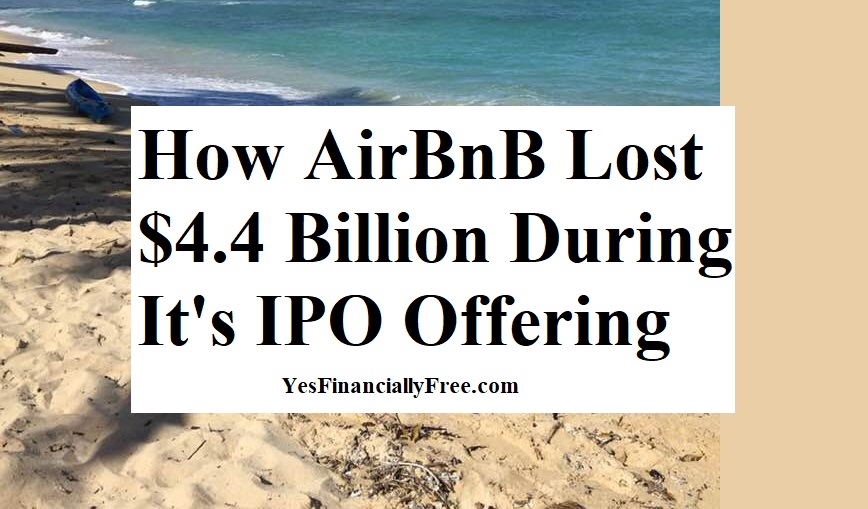
How AirBnB Lost $4.4 Billion During It’s IPO Offering
If you invested in AirBnB during it’s IPO offering you may have lost money or made money, however, today we are going to talk about How AirBnB Lost $4.4 Billion During It’s IPO Offering.
I just learned about this yesterday from an article entitled Better Than IPOs: Buy This Low-Risk/High-Reward Alternative in Ian King’s January 2021 newsletter called Automatic Fortunes.
So I’m going to share the story with you today so you can learn a little bit about how Wall Street makes their money off of the hard work of business creators like AirBnB.
If you haven’t already, subscribe to my e-mail list and get the free e-book, Working Parents Guide to Financial Freedom sent directly to your inbox today by entering your name and e-mail on the right, and pressing the red YES button =)
I send e-mails on all my blogs and events, so it’s full of great information all designed to make you financially free as fast as possible.
AirBnB was a Private Business Until 2020 – When It Almost Went Out of Business and Went Public with an Initial Public Offering (IPO)
I know it first hand because my husband and I own a 1 bedroom 1 bathroom condo in Waikiki which is an AirBnB business. CLICK HERE to see it yourself.
We also almost went out of business when CoVid-19 hit and AirBnB refunded everyone their money.
We survived but if AirBnB had gone under, we would have sold our property and closed shop.
So, it’s easy for me to understand why AirBnB almost went out of business.
They had to get outside investors to come in and save the business, and the small businesses that depended on them as well.
And that’s when they refused an offer from William Ackman, who created a company called Pershing Square Tontine Holdings Ltd. (NYSE: PSTH).
His company PSTH is a Special Purpose Acquisition Company (SPAC). A SPAC is a publicly traded company used to acquire exisiting companies.
He offered to merge his SPAC filled with $4 Billion in Cash with AirBnB, thus making them public without involving a middle man, and giving them the cash infusion they desperately needed.
Instead, they chose the traditional route, and here are the details from an article by Ian King in his January 2021 newsletter Automatic Fortunes.
“Shares were prices at $68 and opened for trading at $146. This was a quick 115% gain for institutions with good fortune of having friends in high places. But the retail investors who bought the open price saw their investment tumble 17% over the next three days.”
“Bloomberg reported that AirBnB rebuffed Ackman’s offer and decided to go the traditional route. After Airbnb’s IPO left $4.4 billion on the table (the difference between the IPO pricing and first trade), it may have regretted passing on Ackman’s offer.”
How Banks And Big Players Make Money on IPOs
There is a great explanation in the article which helped me understand who is making the big bucks in these IPO offerings.
“…when a company wants to issue equity (stock) or debt, it calls its bank, such as Goldman Sachs or Morgan Stanley.
Then the bank’s analysts figure out the market value of the proposed debt or equity offering. This helps during the marketing pitch.
Next is the “roadshow.” This is when the bankers take the prospective company to meet with its biggest investors in cities across the country.
When it comes time to price the new offering, the bank takes indications of interest from its other accounts. If the offering is in high demand, it will be oversubscribed. That means there are more orders than available stock…
…It’s a dirty little secret for Wall Street. If you run a fund that pays millions in commissions to the bank, you get first dibs on the next hot IPO or debt deal. If you’re a small customer, you get the scraps.
And if you’re a mom-and-pop shop managing your retirement account, you get nothing…zilch…not a thing!”
Conclusion
It surprised me how AirBnB lost money in it’s IPO.
I figured the company owners would take a huge profit.
It’s amazing to see how the banks as a middle man scooped out $4.4 Billion of equity value in exchange for commissions to large mutual funds and their largest investors.
SPACs are something I really didn’t understand until last night.
Basically, Bill Ackman opened a SPAC, with shares issued at $20/share. There was enough investors to raise $4 Billion dollars!
Since his SPAC is already publicly traded, it doesn’t need to go through a bank.
The members of the SPAC vote on a deal. If there is no deal found in 2 years, they get $20 back per share.
It’s a method for everyday retail investors, like you and me, to get in on an IPO.
However, you have to be careful not to buy into the SPAC when it is too overpriced.
If you buy shares in PSTH at $30 a share, and Bill Ackman doesn’t find an investment in 2 years, then you will only get back $20 a share.
However, if he does find a good company to merge with, then you could see your initial $20 investment jump much higher.
I hope this article was helpful to you whether you are a business owner or a retail investor.
If you want to learn more about investing wisely, check out our current Security Analysis Mastermind by clicking here, reading the information and getting started!